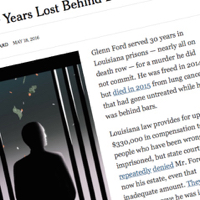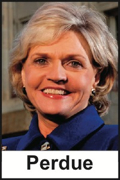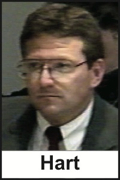Rascals case in brief
In the beginning, in 1989, more than 90 children at the Little Rascals Day Care Center in Edenton, North Carolina, accused a total of 20 adults with 429 instances of sexual abuse over a three-year period. It may have all begun with one parent’s complaint about punishment given her child.
Among the alleged perpetrators: the sheriff and mayor. But prosecutors would charge only Robin Byrum, Darlene Harris, Elizabeth “Betsy” Kelly, Robert “Bob” Kelly, Willard Scott Privott, Shelley Stone and Dawn Wilson – the Edenton 7.
Along with sodomy and beatings, allegations included a baby killed with a handgun, a child being hung upside down from a tree and being set on fire and countless other fantastic incidents involving spaceships, hot air balloons, pirate ships and trained sharks.
By the time prosecutors dropped the last charges in 1997, Little Rascals had become North Carolina’s longest and most costly criminal trial. Prosecutors kept defendants jailed in hopes at least one would turn against their supposed co-conspirators. Remarkably, none did. Another shameful record: Five defendants had to wait longer to face their accusers in court than anyone else in North Carolina history.
Between 1991 and 1997, Ofra Bikel produced three extraordinary episodes on the Little Rascals case for the PBS series “Frontline.” Although “Innocence Lost” did not deter prosecutors, it exposed their tactics and fostered nationwide skepticism and dismay.
With each passing year, the absurdity of the Little Rascals charges has become more obvious. But no admission of error has ever come from prosecutors, police, interviewers or parents. This site is devoted to the issues raised by this case.
On Facebook
Click for earlier Facebook posts archived on this site
Click to go to
Today’s random selection from the Little Rascals Day Care archives….
Click for earlier Facebook posts archived on this site
Click to go to
Today’s random selection from the Little Rascals Day Care archives….
Better not to be wrongfully convicted in the first place
 May 18, 2016
May 18, 2016
Even where (wrongful imprisonment) compensation laws exist, they can be badly flawed. Most states, like Louisiana, place the burden on people who were wrongly convicted to prove their innocence before any payment is made. Several states offer embarrassingly small payouts…. Others have laws riddled with unreasonable restrictions…. Some refuse to pay anyone who pleaded guilty or who confessed to a crime he or she did not commit, despite evidence that many innocent people do both….”
– From “Paying for Years Lost Behind Bars,” editorial in the New York Times (May 18)
And some states – well, actually, just one – have governors who withhold compensation for nine months while gratuitously reinvestigating a DNA exoneration.
![]()
Perdue removes one stain, leaves another
Jan. 2, 2013
What a bittersweet moment, reading Gov. Bev Perdue’s statement announcing her pardon of innocence for the Wilmington 10.
 Surely, for the six surviving defendants, the pardon represents far too little justice, far too long delayed. But so many of Perdue’s words apply poignantly to a more recent “dark chapter in North Carolina’s history” – the prosecution of the Edenton Seven:
Surely, for the six surviving defendants, the pardon represents far too little justice, far too long delayed. But so many of Perdue’s words apply poignantly to a more recent “dark chapter in North Carolina’s history” – the prosecution of the Edenton Seven:
“I have decided to grant these pardons because the more facts I have learned… the more appalled I have become about the manner in which their convictions were obtained….
“This conduct (of prosecutor Jay Stroud) is disgraceful. It is utterly incompatible with basic notions of fairness and with every ideal that North Carolina holds dear. The legitimacy of our criminal justice system hinges on it operating in a fair and equitable manner…. That did not happen here. Instead, these convictions… represent an ugly stain on North Carolina’s criminal justice system….
“Justice demands that this stain finally be removed. The process in which this case was tried was fundamentally flawed….”
As noted previously, state government has continued to withhold exoneration from the Little Rascals defendants. In addition to these reasons that the Edenton Seven haven’t matched the Wilmington 10 in capturing the public eye, there is this notable difference in the two cases:
No one involved in prosecuting the Wilmington 10 remains in office, and the current Pender County district attorney has accepted Perdue’s decision without complaint. But two decades after prosecuting the Edenton Seven, Bill Hart and Nancy Lamb remain on the job, no doubt ready to beat down any hint of exoneration.
Child sex trafficking: 21st century’s moral panic?
 Aug. 21, 2013
Aug. 21, 2013
“Some advocates have suggested secure facilities for America’s child sex trafficking victims…. Such facilities force troubled children into a system of care that may be just as exploitive as with a pimp/trafficker.
“Countless women continue to seek restitution for the sexual abuse by employees assigned to supervise them while in detention in the ’60s and ’70s – some of these women have children fathered by detention employees….
“So then why do we talk about secure facilities for child victims of sex trafficking? Because ‘sex is at issue’ in their victimization….
“Child sex trafficking is not the first social issue to create moral panic around physical and sexual abuse. In the ’80s, Satanic Ritual Abuse garnered self-proclaimed experts, national media attention, law enforcement mobilizations, federal funding, excitement and hysteria. By the ’90s official investigations produced no evidence of widespread conspiracies and only a small number of crimes were verified….”
– From “Residential Programs for America’s Child Sex Trafficking Victims: Secure or Non-Secure Facilities?” by Dr. Lois Lee, founder and president, Children of the Night, at Huffington Post (July 9, 2013)
Bill Hart played by his own (poker) rules
 June 8, 2012
June 8, 2012
“The duty of the prosecutor is to seek justice, not merely to convict.”
– American Bar Association
“The primary responsibility of prosecution is to see that justice is accomplished.”
– National District Attorneys Association
“If you were playing poker, would you be playing with your full hand
showing?”
– Bill Hart, special deputy attorney general, defending his unwillingness
to share evidence with the Little Rascals defense











0 CommentsComment on Facebook